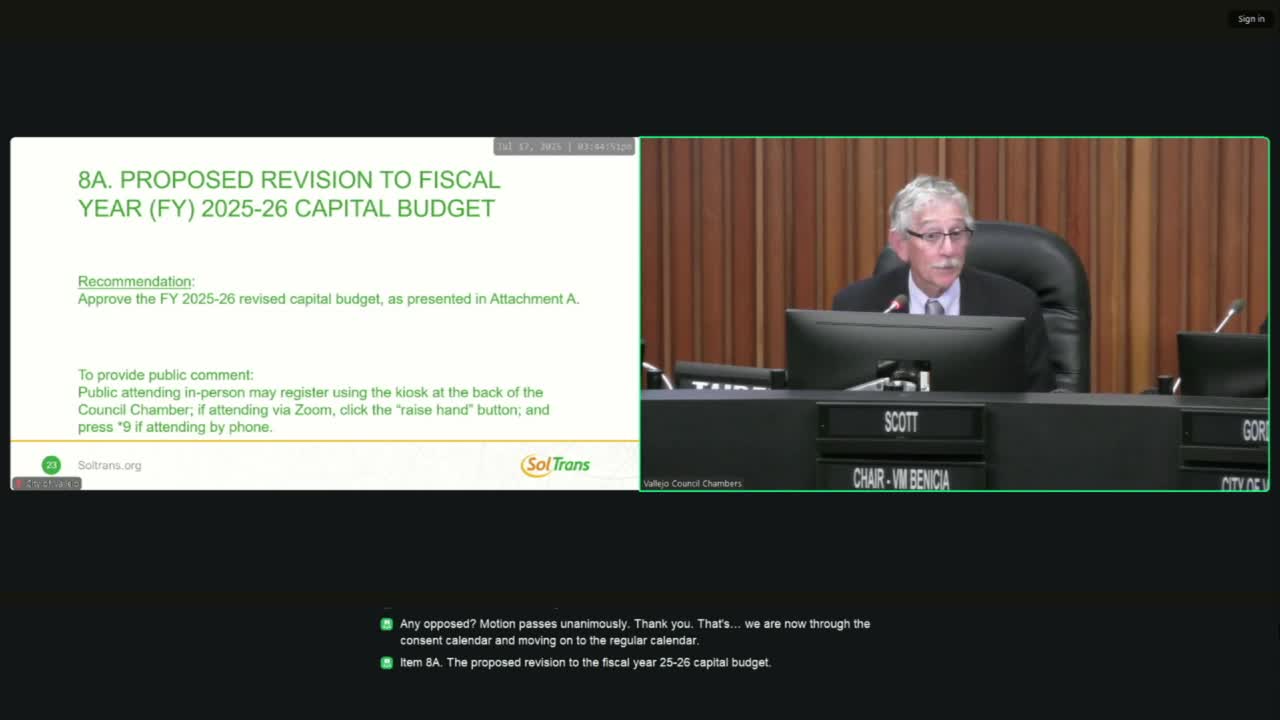SolTrans board approves carryover funding after charger equipment damage delays electrification
Get AI-powered insights, summaries, and transcripts
Subscribe
Summary
The SolTrans board unanimously approved a revised FY25–26 capital budget to cover $1.1 million in remaining electric-bus charger costs after equipment damage delayed completion; staff said the work will be funded with previously programmed LC TOP funds and savings from a canceled inductive-charging project.
The SolTrans Board of Directors unanimously approved a revised fiscal year 2025–26 capital budget to carry forward costs for its fleet electrification project after equipment damage delayed completion. The board voted to reallocate previously programmed Low Carbon Transit Operations Program (LC TOP) funds and other budget savings to cover the remaining work.
Board members voted to adopt the amendment at the meeting after staff described a power-up incident that damaged equipment and halted work on some chargers. “We had a slight glitch in our electrification, when things were powered up. There was a piece of equipment damage has to be replaced,” a staff presenter said, adding the contract for the project had already been board-approved.
The amendment matters because the agency must pay outstanding contractor invoices and retention when the work is finished. Staff estimated the bulk of the roughly $1,100,000 remainder is contract costs tied to the contractor’s work. The presenter told the board that the agency will fund the remainder with state LC TOP money that had originally been designated for an inductive-charging project the agency has canceled.
Staff said consultants advised that SolTrans does not need inductive charging for its current routes and buses, and that the cost of installing inductive infrastructure — including about $80,000 per bus for onboard receivers — made the project uneconomical. “They said, you do not need inductive charging for the way you’re running business now,” staff said. “The cost to construct and put inductive charging is so costly.”
Board members asked about contractor accountability and schedule. Staff said the construction manager is compiling day logs to determine whether the work has exceeded contract timelines and to assess any penalties. Project manager Pat Carr has been out, staff said, but communications with the construction manager indicate the contractor has paid some costs incurred so far. Staff said they would invoke contractual remedies if additional contractor costs are incurred and would seek to recoup extra expenses.
“Interestingly, we actually talked to the FTA reviewers about this because that’s a federalized contract,” staff said, describing federal reviewers’ focus on ensuring the agency is made whole rather than pursuing punitive fines.
Board members also asked why previous board-approved vendor contract increases were not reflected earlier in the capital budget. Staff said some contract increases were approved but an amended capital budget was not brought back to the board; the presenter said she would add clarifying language to future contract increases so the capital budget is updated automatically.
The board approved the revised capital budget as presented. Staff said they will continue to track days on the project, work with legal counsel on potential recoupment from the contractor if necessary, and finish the electrification work when the replacement equipment arrives.
Costs and funding details provided at the meeting included a roughly $1,100,000 carryover for the electrification contractor, an $85,000 TA allocation already programmed for other capital work, and the decision to reprogram LC TOP funds originally reserved for inductive charging. The board did not set a new completion date at the meeting.
The vote was unanimous.
